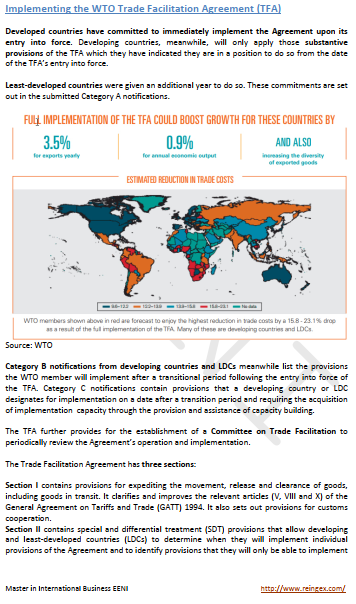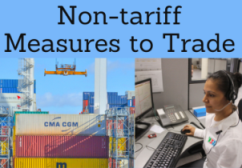Trade Facilitation Agreement (TFA) WTO
Analysis of WTO Trade Facilitation Agreement. Provisions

With the Trade Facilitation Agreement (TFA), WTO members established a new legal framework for the necessary reforms to be implemented for trade facilitation. It was founded in the 2001 Doha Round.
The objective of the Trade Facilitation Agreement (TFA) of the World Trade Organization (WTO) is to establish a legal framework that allows the reform of Trade Facilitation at a global level, speeding up the movement, release and customs clearance of products.
- Introduction to the Trade Facilitation Agreement (TFA) of the World Trade Organization (WTO)
- Fundamentals of the Trade Facilitation Agreement
- Substantive provisions
- Provisions for special and differential treatment for developing and least developed countries
- Institutional provisions and final provisions
- Annual report on WTO Trade Facilitation Agreement
- Implementation of WTO Trade Facilitation Agreement
- Strategy of the Mercator program of the World Customs Organization
- Legal text of WTO Trade Facilitation Agreement
Sample - Trade Facilitation Agreement (TFA):

The educational aims of the Subject «Trade Facilitation Agreement (TFA)» are:
- Understand the pillars of WTO Trade Facilitation Agreement (TFA)
- Know the concepts of substantive provisions in the scope of the Agreement on Trade Facilitation
- Analyze the provisions on special and differential treatment for developing and least developed countries

The Subject «Trade Facilitation Agreement (TFA)» is included within the curriculum of the following academic programs at EENI Global Business School:
Logistics Courses: International Transport, Maritime Transport, Multimodal, Road, Rail, Transport and Logistics in Africa.
Masters: International Business, Foreign Trade, International Transport, Transport and Logistics in Africa.


Languages:  or
or  Accord sur la facilitation des échanges (AFE)
Accord sur la facilitation des échanges (AFE)  Acuerdo sobre Facilitación del Comercio (AFC)
Acuerdo sobre Facilitación del Comercio (AFC)  Acordo de Facilitação do Comércio.
Acordo de Facilitação do Comércio.

The substantive obligations of the Trade Facilitation Agreement (TFA) include the obligation to publish as well as access to information, appeal channels, trade procedures simplification, customs clearance processes, cross-border customs cooperation among institutions that operate at the border, reduction of non-tariff measures, use of information technologies...
Also included provisions related to special and differential treatment of Trade Facilitation for least developed countries (LDCs) and developing countries (LDCs), including technical assistance.
WTO has other agreements related to Trade Facilitation:
- Agreement on Customs Valuation
- Preshipment Inspection
- Agreement on Preshipment Inspection
- Agreement on Rules of Origin
See also:









 WhatsApp
WhatsApp